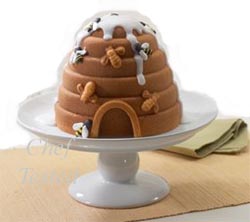"Tooby ooby walla, Nooby abba nabba"
The Merry Month of May at Lanham Village
A few points in our favor: S**** the Aussie, C*****'s mom M*****, and M**** showed up. The M***** sent a longish email detailing a myriad of minor issues and complaints that was a masterpiece of diversionary strategy. Really, she is a wise woman. I acknowledge this fully. E*** the landscaper, cordially distant and professional when it was his own time in the community broiler, set a tone of quiet voices and reasonable discussion for the night.
(*Apologies for not introducing C*****'s mom M***** before. C****** is a preteen fairly auditioning for the part of Harry Potter's American transfer student pal – a character Ms. Rowling somehow overlooked writing into her plot, but Hollywood's got a couple of flicks to improve on literature. C****** was there when we installed the bees and I could see that he'd be up for donning the guest hat and veil and helping me with a hive inspection someday.)
But when our agenda's millwheel ground around to Committee Reports/Garden Chair/Beehives, the entire room shifted attention to our opponent, giving her the floor to make her case first.
With all eyes on her, she quickly got to it. "Did the Board approve this beehive?" (As it happens, no it didn't. As it happens, we didn't ask. As it happens, we didn't make more than a brief amount of noise about it to the Board or anyone for reasons that will soon be evident.) The Board shrugged through this with the idea that the Garden was its own thing. But she had her advantage: the Garden was still property of the neighborhood and, as such, the neighborhood was liable.
Indeed, the words "sting" "liability" and "death" got strung together fairly quickly in an alarmist necklace of fear.
And where do you go with this? In one corner: an insect that evolution (or whatever you may call the Higher Power in your little corner of this great world…but I'm going with evolution for the moment, I am…) has honed into a perfection of function and form. In the other: a two/plus-century old culture that mistrusts the material world and assigns anthropocentric moral qualities to those parts of it that bite and sting and defend.
I've mentioned The Hive, Bee Wilson's cultural history of bees and humanity, before. (And again: it IS her name. Her parents were clairvoyant enough to see a future apian advocate in their daughter.) Reading it proved upsetting, even if it did give me a sense of what I would be up against with my bees. In her chapters on stinging, death, and warfare, grim stories unfold.
Like this one: Richard the Lion Hearted and his beehives of mass destruction. Thirteen "shippes" hauling hundreds of hives in their cargo holds, sailed over with the Greg Brady of Henry II's Bunch to the Holy Land. Once there, all hives and their inhabitants get catapulted over Saracen walls as airborne missiles of a sort, with effective enough results for Richard but certain death for his conscripted bees.
Or this one from 1862, Antietam, when the Confederate Army opens fire on a farm of beehives between them and advancing Union troops, causing panic and disarray. The farm is later a battlefield graveyard of over 700 dead.
Onward to the twentieth century to the 'Battle of the Bees,' a WWI skirmish that went badly (as opposed to, oh I don't know, all those other ones of that War that went so swimmingly…) in Tanga, Africa. It didn't get much accurate press coverage at the time because of the high casualty count (847 to the Germans' 148),* but later -- freakin' years later! – a letter to the Times claimed that the nefarious Germans had attached tripwires to wild hives of local bees and that was the obvious cause of the heavy British losses. A week after that foolishness, another letter astutely pointed out that everyone's machine gun fire and inadequate equipment on the one side was most likely the real culprit and that the enraged bees knew no allegiance to the Kaiser.
(*Yeah, what's up with the media and its inability to accurately report on its country's wars? Seems like we've all had enough practice.)
Oh. And speaking of Germany…
Once upon a time, in medieval Germany, Wilson tells us, a wee babe playing near a hive was stung. "To death," our opponent would gloat in her slavering, rosary-bead clutching tones. In retribution, the Great Council of the City gathered up all the beehives they could find – all of them! -- and burnt them in the town square. And thereby, they reasoned, exacted a punishment, served justice and set an example to other insects.
Same as it ever was. Far be it for me to ask where little Hansel's inattentive parents might have been at the moment when their offspring was crawling inquisitively toward the self-contained community of another species.
As for me, I'd like to think the name of that bee-fearing town was Hamlin.* When the terrible smoke of the melted wax and burnt honey and the thousands of bee bodies cleared, I can imagine one of worthy burghers saying "Dude. Check it out. Isn't that a rat over there near Johann's stein shop? And by the International Haus of Pancakes, I think that's another one …"
(*Here at home and re-reading the passage. It was the village of Worms, actually, sometime before 1521. So, you know. A town with a busy social calendar. The husband also points out "Bet their crops sucked for a few years, though.")
But it's stories like these that always make me want to reach back into the pages of History and throttle the first person I can lay my hands on.
Worse yet, I've since learned that the very beekeepers of yore themselves had been party to slaughter and destruction. The old-fashioned 'skep' that later became a hair-style inspiration to Ronnie Bennett and a thousand kohl-eyed girls of the early sixties was essentially a chamber of death for its inhabitants. With no lid, frames, or 'bee-space,' the only way to harvest the honey at season's end was to simply rip apart such hives, destroying their inhabitants. Some beekeepers even recommended systematic destruction to encourage an increase in overall bee population.
***
Eventually, it gets better. All is not public executions and hive warfare and skep slaughter. It's Rev. Lorenzo Lorraine Langstroth, an American (Yeah, Team USA! High five!) clergyman suffering from mental health problems, who finally figures out the mystical solution to the bee's needs and our own. I've already used the term "bee space" and a weird, little wonderful thing it is too.
How wonderful? When Langstroth picks up his luggage from the great Celestial Carousel in Arrivals, Francis of Assisi is waiting out in the Meeting Spot with his name on a cardboard sign. "You the man," says Francis, shaking his hand. "No, you the man" says Langstroth. "No, YOU the man," replies Francis. "Look, we're all just hangin' at O'Neill's* over at Terminal 3, waiting for Muir, Cousteau and Rachel Carson if you wanna join? It's Krishna's millennium to buy the rounds."
(*That pub franchise is everywhere! And I'm not exactly sure why I imagine Heaven to be modeled after Heathrow, because it sure isn't the other way around.)
Bee Space is 3/8th's of an inch. Always. It's the exact measurement of space between objects that a bee needs to move about without feeling the compulsion to build the connective comb that would seal its fate in a future tomb, should humanity be in the mood for a taste of its honey. On October 30, 1851, Langstroth invents a movable frame hive incorporating bee-space. His design still in use today. I've got two of them.
And this means: we can harvest our honey without destroying our hives.
Like the geometric precision of those freakingly amazing hexagonal cells, the simple, beelife-saving perfection of bee-space is one of those things that us Californians shouldn't spend too much time thinking about because we then invariably start up vaguely utopian religions where everyone sings "Good Morning Starshine" in the Sunrise Circle and clothing is optional in the meditation room.
Which reminds me: Beekeepers of Marin meeting tonight. Second one for us. I've now managed to convince myself that these people are not running a front for keychain parties and Swingers Clubs. And as they will now be part of the political coalition we're hoping to build -- because things are still not resolved between us and the Homeowner's board -- I'm wearing my v-neck top and a bit of lipstick. Can't hurt!
Til the next thrilling chapter,
"Bee" Templeton




